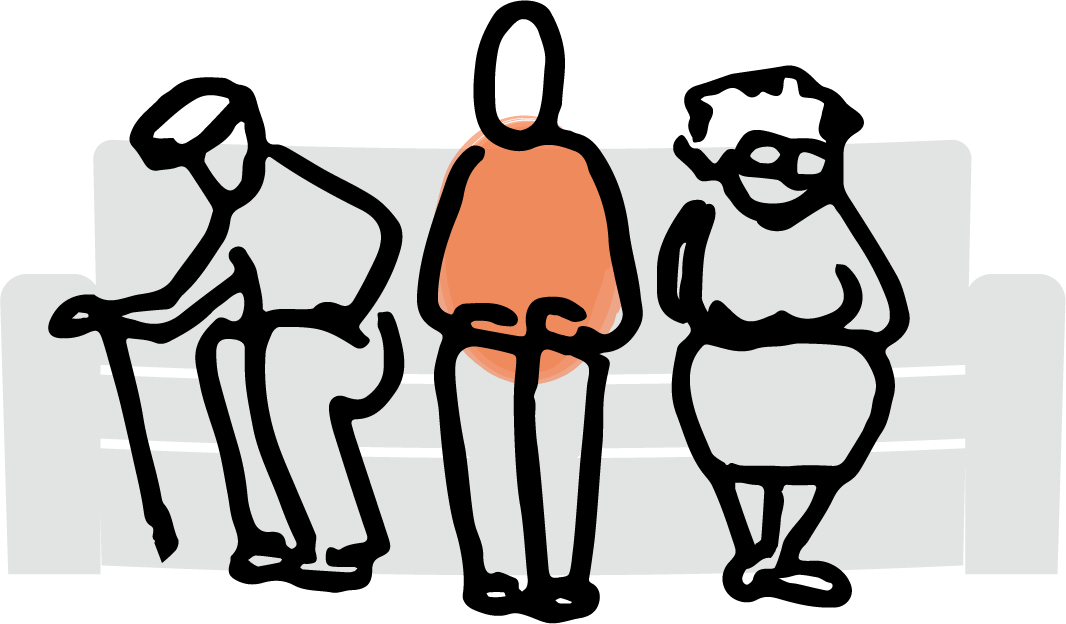The train in the distance
It happens to all of us — and no one sees it coming.
Why would you?
The only thing harder to accept than the day you turned 40 — or 50! — is the moment you realize that you’re not the only one who’s been getting older.
So have your parents. And they’ve had a head start.
Of course, that’s not exactly news. Your parents have always been older than you. You send birthday cards every year. You can do the math. But in your head, your parents are never as old now as your grandparents were then.
Until one day you can’t help but notice that somehow, when you weren’t looking, your parents got old. Maybe your mother is winded at the top of the stairs. Or it's your father’s second fender bender in as many weeks. Or your friend’s story about how she's been helping her mother deal with the damage from clicking on an email link that — surprise! — wasn’t from her mother's bank, after all.
That's when you realize that the next part of your parents' journey is absolutely going to affect the next part of yours. And the sound of the train you’re hearing in the distance is getting closer.
Now this? Really?
Talk about bad timing. It’s not like you don’t have enough to deal with. Your life is in high gear. You’ve got a career. Responsibilities. Relationships. Maybe you’ve got kids at home. Or kids in college. Or kids who went to college who moved back home. You’re grinding it out, getting things done, and moving forward. You had plans.
And those plans have been on hold. After paying your dues for decades — and years of pandemic lockdowns and loss — you’re ready to get on with your life.
But now you’re wondering if that thing you’ve noticed about Dad is a thing you need to worry about. Because he doesn’t seem to notice, or care. And he sure doesn’t want to talk about it.
Dammit! You were almost there. And now this? Really?
Welcome to midlife with aging parents.
Have a seat. We’ve been waiting for you.
Take a deep breath. It’s normal to feel overwhelmed and a bit disoriented. One reason is that following the instincts that got you this far, even with the best of intentions, can backfire.
A common mistake is rushing to solve problems and "fix" your parents — only to make things worse. Another is procrastinating so you can avoid difficult emotions and conversations. Even more common: tying yourself in knots from the never-ending worry that you aren't doing enough.
That kind of chronic stress takes a serious toll on your physical and mental health — and it's not sustainable.
Our generation of adult children is caring for a generation of aging parents who are living longer and more independently than any previous generation. For many of us, answering the call to help will be a 10-to-20-year journey.
That's a big chunk of prime time, especially at midlife. And it happens while we're getting squeezed by ever-increasing time and financial pressures that leave us even less margin for error than our parents had.
We've been planning for lifecycle events our entire lives. Where to go to college. Weddings. Buying a home. Starting a family. Saving for the kids' education. We plan for our career. We plan for retirement.
What most of us rarely consider, much less plan for, is how aging parents will impact our lives. It's the elephant in the room most of us don't see — or don't want to see — coming.
Until there's a crisis. Mom has a bad fall and breaks her hip. Or Dad's memory problems are more serious than forgetting where he puts the car keys. Suddenly, it's go time. We jump into the deep end of the ocean without a life jacket and burn ourselves out trying to keep our head above water.
For too many of us, that's our introduction to life with aging parents.
But it doesn't have to be.
Why we’re here
My Aging Parents is about finding a better way to manage the changes and challenges of midlife with aging parents. It's a free email newsletter of practical, hand-picked tips and strategies about what to expect when you're expecting aging parents. Ten minutes. Every other week. From one adult child who cares to another.
We'll cover the kind of things most people only learn the hard way:
- Warning signs your parent may need help
- Warning signs you need help!
- How to talk to your parents about things they don't want to talk about
- Essential legal docs you need BEFORE the sh*t hits the fan
- How to handle uncertainty, anxiety, and frustration
- Home modifications that make it easier and safer to live at home as long as possible
- How to manage your changing role with compassion for yourself and your parent
Figuring out how to help your aging parents isn't something that just happens. There are no hacks or shortcuts. Every family is different. Every circumstance is different.
The only thing you can count on is that the train in the distance is getting closer.
That's why My Aging Parents is here.
You're here because you care — and your parents are lucky to have you.
Join us by signing up below.
And let's get started. While we're still young!


Founder, My Aging Parents
About Ethan
Ethan is a grateful son to his late father and 80-year-old mother, the oldest of four siblings, husband to an incredibly patient wife, and father of two (mostly) adult children. After more than 40 years as a writer, editor, and marketing consultant, he's on mission to find a better way to help aging parents — before he becomes one.
How to live through midlife with aging parents.
Practical tips and strategies to manage the changes and meet the challenges of helping your aging parents. Hand-picked and delivered by email biweekly.
No charge. No spam. Unsubscribe anytime.
